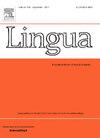影响韩国语指示无效主体可恢复性的参数实证研究
IF 1.3
3区 文学
0 LANGUAGE & LINGUISTICS
引用次数: 0
摘要
韩国语是一种空主语语言,可以在句子中省略明显的主语。在原则和参数理论的框架内,韩国的空主语传统上用topic-drop参数来解释,该参数假设省略的主语通过将它们连接到明确的话语主题的主题链来恢复。然而,这种机制本身不足以解释指示性空主语,它主要指说话者或收件人,不需要先前介绍的主题。本研究以实证和系统的方法,评估复合体内的语言参数在解决韩国语指示空主语中的贡献。总共开发了208个启发式规则,整合了各种形态-句法和词汇特征,并将其纳入统一的空主语解析系统-这是在单个系统中全面评估多个参数的第一次尝试。该系统在15883个包含空主语的谓词上进行了测试,测量了每个参数对恢复话语参与者-指称物的影响。该系统成功识别了86%的话语参与者相关的空主题,准确率达到99%。此外,对个别规则表现的分析强调了动词后缀在识别和恢复指示空主语方面的关键作用。这些发现强调了言语复合体中显性语言特征对韩国语指示无效主体的可恢复性的重要性,特别是那些与话语参与者相关的语言特征。本文章由计算机程序翻译,如有差异,请以英文原文为准。
An empirical study on parameters affecting the recoverability of deictic null subjects in Korean
Korean is a null subject language, allowing the omission of overt subjects in sentences. Within the framework of principle and parameter theory, Korean null subjects have traditionally been explained by the topic-drop parameter, which assumes that omitted subjects are recovered through topic chains linking them to an explicit discourse topic. However, this mechanism alone is insufficient to account for deictic null subjects, which primarily refer to the speaker or addressee and do not require a previously introduced topic. This study empirically and systematically evaluates the contribution of linguistic parameters within verbal complexes in resolving Korean deictic null subjects. A total of 208 heuristic rules were developed, integrating various morpho-syntactic and lexical features, and were incorporated into a unified null subject resolution system—the first attempt to comprehensively assess multiple parameters within a single system. The system was tested on 15,883 predicates containing null subjects, measuring the impact of each parameter in recovering discourse participant-referents. The system successfully identified 86% of discourse participant-related null subjects, achieving an accuracy rate of 99%. Additionally, an analysis of individual rule performance highlighted the crucial role of verbal suffixes in identifying and restoring deictic null subjects. These findings underscore the significance of explicit linguistic features in verbal complexes for the recoverability of deictic null subjects in Korean, particularly those linked to discourse participants.
求助全文
通过发布文献求助,成功后即可免费获取论文全文。
去求助
来源期刊

Lingua
Multiple-
CiteScore
2.50
自引率
9.10%
发文量
93
审稿时长
24 weeks
期刊介绍:
Lingua publishes papers of any length, if justified, as well as review articles surveying developments in the various fields of linguistics, and occasional discussions. A considerable number of pages in each issue are devoted to critical book reviews. Lingua also publishes Lingua Franca articles consisting of provocative exchanges expressing strong opinions on central topics in linguistics; The Decade In articles which are educational articles offering the nonspecialist linguist an overview of a given area of study; and Taking up the Gauntlet special issues composed of a set number of papers examining one set of data and exploring whose theory offers the most insight with a minimal set of assumptions and a maximum of arguments.
 求助内容:
求助内容: 应助结果提醒方式:
应助结果提醒方式:


